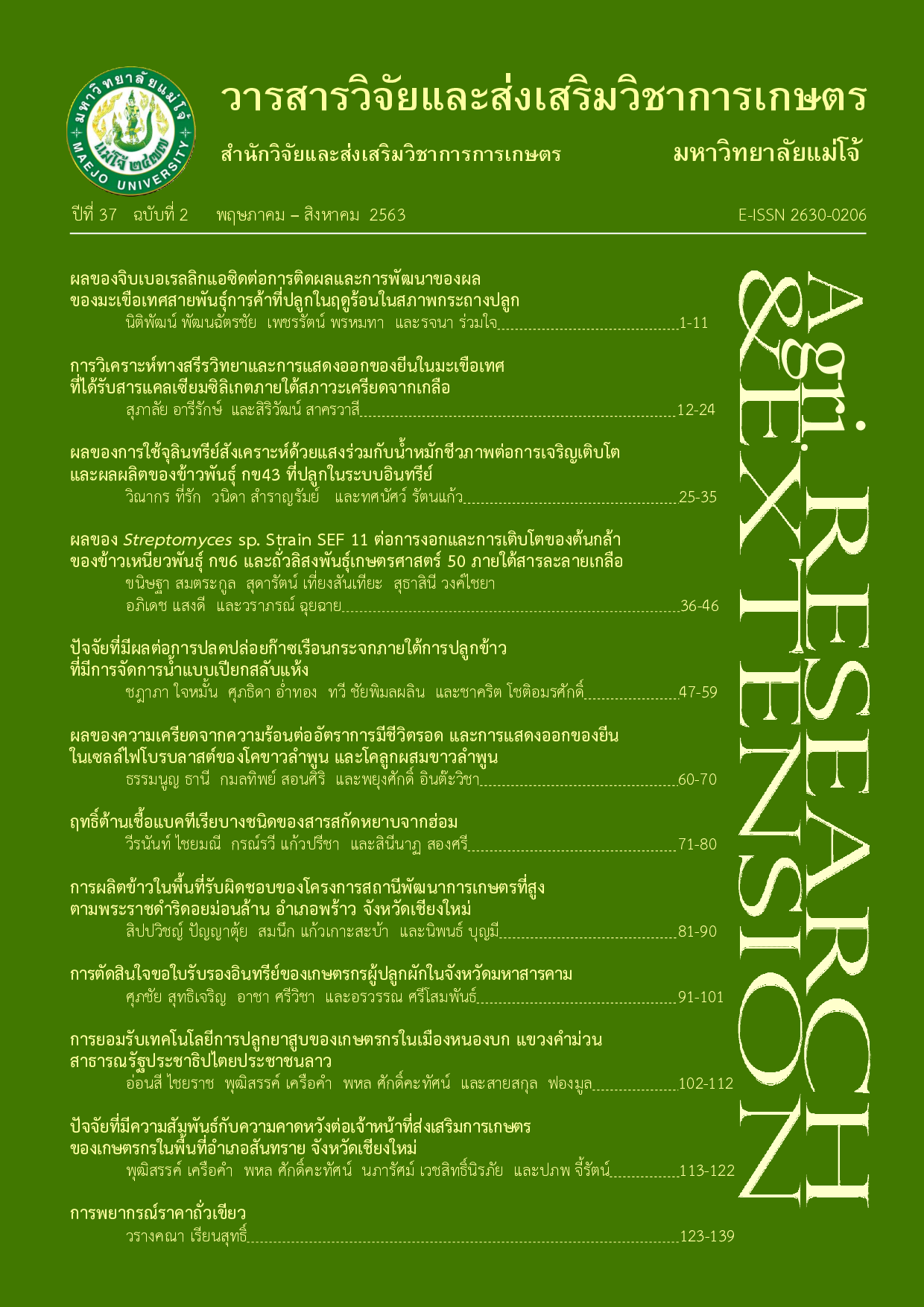การตัดสินใจขอใบรับรองอินทรีย์ของเกษตรกรผู้ปลูกผักในจังหวัดมหาสารคาม
คำสำคัญ:
ผักอินทรีย์, การตัดสินใจ, ใบรับรองเกษตรอินทรีย์บทคัดย่อ
การศึกษาในครั้งนี้มีวัตถุประสงค์เพื่อวิเคราะห์ปัจจัยที่มีอิทธิพลต่อการตัดสินใจขอใบรับรองอินทรีย์ของเกษตรกรผู้ปลูกผักในจังหวัดมหาสารคาม ประชากรกลุ่มเป้าหมายที่ใช้ในการวิจัย คือ จำนวนเกษตรกรที่ ขึ้นทะเบียน จำนวน 320 ราย ซึ่งแบ่งเป็นกลุ่มที่ทำเกษตรอินทรีย์ จำนวน 80 ราย และกลุ่มที่ไม่ทำเกษตรอินทรีย์ 240 ราย โดยมีการกำหนดกลุ่มตัวอย่างแบบเจาะจง (Purposive sampling) จากการสัมภาษณ์เกษตรกรจำนวน 80 ราย ได้แก่ เกษตรกรผู้ปลูกผักอินทรีย์ที่ได้รับใบรับรองจำนวน 43 ราย และเกษตรกรผู้ปลูกผักอินทรีย์ที่ไม่ได้รับใบรับรองจำนวน 37 ราย ประมาณค่าความสัมพันธ์ของ ตัวแปรอิสระ 5 ด้าน (ปัจจัยพื้นฐานส่วนบุคคล ปัจจัยด้านเศรษฐกิจ ปัจจัยด้านกายภาพของฟาร์ม ปัจจัยด้านสังคมและการสื่อสาร และปัจจัยด้านทัศนคติของเกษตรกร) กับการตัดสินใจขอใบรับรองของเกษตรกรโดยใช้แบบจำลองถดถอยโลจิสติกส์ ผลการประมาณค่าสมการพบว่า ค่า Prob = 0.000 และค่า Pseudo R2 = 0.7487 หมายถึง ตัวแปรอิสระในแบบจำลองสามารถอธิบายการเปลี่ยนแปลงของ การตัดสินใจขอใบรับรองอินทรีย์ของเกษตรกรได้ร้อยละ 74.87 โดยปัจจัยที่มีอิทธิพลต่อการขอใบรับรองอินทรีย์ ของเกษตรกรตัวอย่างอย่างมีนัยสำคัญทางสถิติ ได้แก่ ระดับการศึกษา ทัศนคติด้านการส่งเสริม และปัญหาการเข้าทำลายของโรคและแมลงศัตรูพืช ดังนั้น การดำเนินนโยบายส่งเสริมจากหน่วยงานราชการที่เกี่ยวข้องเป็นกลไกสำคัญ ในการเพิ่มอัตราการของใบรับรองของเกษตรกรผู้ปลูกผักอินทรีย์ โดยการส่งเสริมดังกล่าวควรเน้นการทำความเข้าใจกับกลุ่มเกษตรกรเป้าหมายที่มีระดับการศึกษาขั้นพื้นฐานเนื่องจากแนวโน้มการตัดสินใจขอใบรับรองน้อยกว่าเกษตรกรที่มีระดับการศึกษาสูง นอกจากนั้นการให้ความรู้หรือการช่วยเหลือเกษตรกรเพื่อแก้ไขปัญหาโรคและแมลงศัตรูพืชตามแนวทางการผลิตแบบอินทรีย์ เป็นสิ่งจำเป็น ในการส่งเสริมการยอมรับระบบการผลิตแบบอินทรีย์ที่ยั่งยืน
เอกสารอ้างอิง
Chiampanyarat, W. 2017. Factors affecting the sustainability of Thai organic farmers lessons from small farmers. Journal of Social Sciences Srinakharinwirot University 20: 199-215. [in Thai]
Daeng-prog, C., P. Phetchana, S. Inthamun, T. phatthorn, P. Rattanaphan, A. Rodlong, A. Chumpatanarot, P. Chiewchal, N. Sathumay, S. warit, L. Saen Wiang and J. Konyoo. 2013. Organic Agriculture Knowledge Guide. Nakhon Pathom: Department of the Army, Ministry of Defense. 81 p. [in Thai]
Ekkun T. 2009. Research Methodology in Behavioral Sciences and Social Sciences 6th edition. Ubon Ratchathani: Wittaya Offset Printing. 259 p. [in Thai]
Forster, D., C. Andres, R. Verma, C. Zundel, M.M. Messmer and P. Mader. 2013. Yield and economic performance of organic and conventional cotton-based farming systems – results from a field trial in India. [Online]. Available https://www.ncbi.nlm.nih.gov/pubmed/24324659 (8 September 2018).
Gomiero, T., D. Pimentel and M.G. Paoletti. 2011. Environmental impact of different agricultural management practices: conventional vs. organic agriculture. Critical Reviews in Plant Sciences 30(1-2): 95124. DOI: 10.1080/07352689.2011.554355.
Khamphannoi, J. 2011. Factors Affecting Decision Making and Production of Organic Rice Production. Master Thesis. Thammasat University. 44 p. [in Thai]
Lohr, L. and L. Salomonsson. 2000. Conversion subsidies for organic production: results from Sweden and lessons for the United States. Agricultural Econnomics 22: 133-146.
MGR Online. 2008. Mahasarakham farmer group, selling organic vegetables. [Online]. Available https://mgronline.com/local/detail/9510000023000 (14 October 2018).
Rattanawaraha, C. 2007. Organic Agriculture. Office of Biotechnology Research, Department of Agriculture. Bangkok: 229 p.
Siriviriyasombun, N., T. Meunghara and L. Thipawan. 2013. Factors affecting the growing of pesticide-safe vegetables of farmers in Bang Yai district, Nonthaburi province. King Mongkut's Agricultural Journal 30(2): 59-67. [in Thai]
Songsrirote, N. and J. Singhapreecha. 2007. Technical efficiency and its determinant on conventional and certificated organic jasmine rice farm in Yasothon province. Tammasart Economics Journal 25(2): 96-133.
Srisompun, O., S. Simla and S. Boontang. 2019. Production efficiency and household income of conventional and organic jasmine rice farmers with differential farm size. Khon Kaen Agr. J. 47 (Suppl.1): 857-862. [in Thai]
Teerasaksopon, K. 2007. Development and Factors that Affect the Decision to Choose Non-chemical Agriculture. Master Thesis. Thammasat University. 223 p. [in Thai]
Veldstra, M., A. Corinne and M. Maria. 2014. To certify or not to certify? Separating the organic roduction and certification decisions. Food Policy 49: 429-426.
Xiong, Y., X. i and P. He. 2016. Farmers’ adoption of pollution-free vegetable farming in China: economic, informational, or moral motivation. [Online] Available http://dx.doi.org/10.1080/233119332.1240022 (20 September 2018).
ดาวน์โหลด
เผยแพร่แล้ว
รูปแบบการอ้างอิง
ฉบับ
ประเภทบทความ
สัญญาอนุญาต
ลิขสิทธิ์ (c) 2020 วารสารวิจัยและส่งเสริมวิชาการเกษตร

อนุญาตภายใต้เงื่อนไข Creative Commons Attribution-NonCommercial-NoDerivatives 4.0 International License.
บทความนี้ได้รับการเผยแพร่ภายใต้สัญญาอนุญาต Creative Commons Attribution-NonCommercial-NoDerivatives 4.0 International (CC BY-NC-ND 4.0) ซึ่งอนุญาตให้ผู้อื่นสามารถแชร์บทความได้โดยให้เครดิตผู้เขียนและห้ามนำไปใช้เพื่อการค้าหรือดัดแปลง หากต้องการใช้งานซ้ำในลักษณะอื่น ๆ หรือการเผยแพร่ซ้ำ จำเป็นต้องได้รับอนุญาตจากวารสาร





